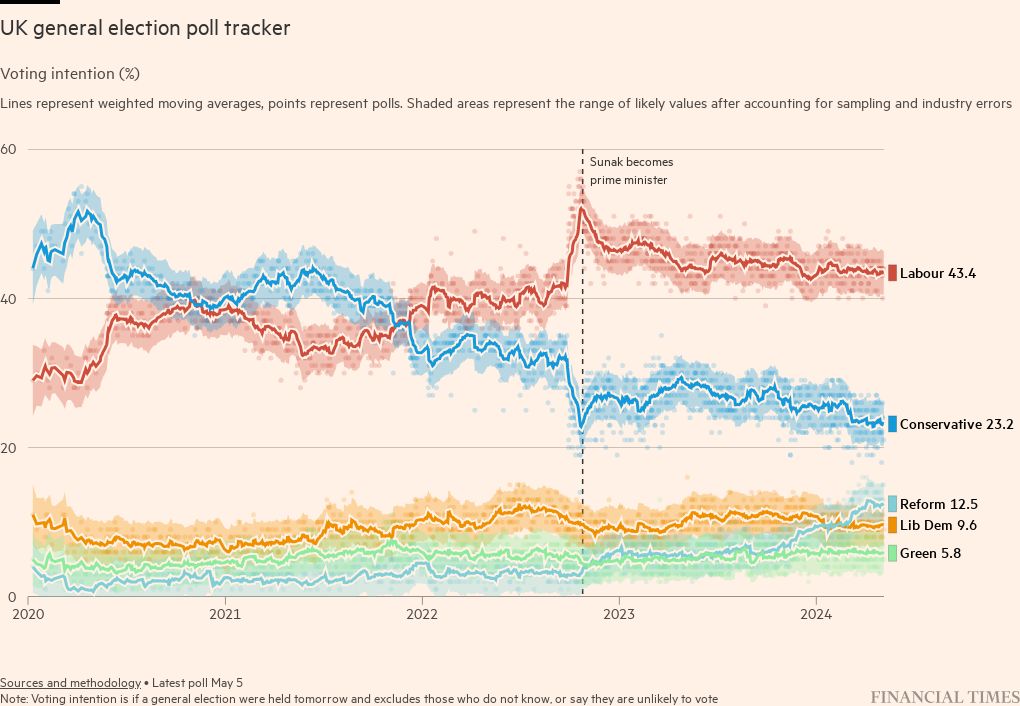Labour is in a strategic hole of its own making

Roula Khalaf, Editor of the FT, selects her favourite stories in this weekly newsletter.
This article is an on-site version of our Inside Politics newsletter. Sign up here to get the newsletter sent straight to your inbox every weekday
Good morning. Keir Starmer has decided that his personal credibility is less of an important asset than Labour’s fiscal credibility, drastically cutting back the scale of Labour’s green transition plans from the £28bn a year he backed in an interview only this week.
Some thoughts on the strategic thinking and some of the personal divisions behind the move.
Inside Politics is edited by Georgina Quach. Read the previous edition of the newsletter here. Please send gossip, thoughts and feedback to insidepolitics@ft.com
Remove the £28bn of shame — put on the £23.7bn of triumph!
Labour will no longer have to defend its pledge to spend £28bn a year on green investment. Instead, the party will have to rally around a policy promise costing £4.7bn a year. That totals £23.7bn over the course of the parliament, of which about half will be funded by borrowing.
There’s an obvious vulnerability here. While going into an election in which the Conservative campaign heavily features the words “Labour”, “borrow” and “£28bn” carries risks, it is not obvious that these risks are materially different if the Tory campaign instead features the words “Labour”, “borrow” and “£11bn”. Both of these are, as far as the human brain is concerned, two impossibly big numbers.
Labour’s theory here is that what made the £28bn per year pledge —announced at Labour’s 2021 conference — so hard to defend was that very little of it was attached to a specific spending commitment.
The named components of the £28bn policy all remain in place — a state-owned energy company called GB Energy costing a one-off £8.3bn, a £7.3bn “national wealth fund” to invest in the decarbonisation of heavy industry and £1.5bn over three years for renewable energy companies hiring workers in Britain’s industrial heartlands. The only concrete policy to have been reduced in scope is the party’s Warm Homes Plan, slashed from £6bn a year to £1.3bn. Labour has now pledged to insulate 5mn homes over five years, climbing down from the previous ambition of retrofitting 19mn homes over the course of a decade.
There are many divergent opinions within the Labour party about who is to blame for the fact that, of the £140bn they had committed to borrowing, the party could only say in detail what roughly £23bn of it was going to be spent on.
Some blame Ed Miliband, who they say successfully used the leverage moment of his speech at the 2021 conference to bounce the shadow Treasury team into opening the cheque book but failed to use most of his haul to do anything. Others put the blame on elements around the leader’s office, such as Morgan McSweeney and the party’s communications chief Matthew Doyle, and on politicians like Pat McFadden who, they say, have all spent much of the time since the 2021 speech trying to walk back the policy, meaning that there was never any time to turn the pledge into something concrete.
Who is right? Frankly I think that’s all a bit of a sideshow. What really matters is that in the here and now, Labour’s theory as to why it is easier to defend £11bn of borrowing than it was to defend £28bn is daft, and its long journey to the new policy, as set out here by Jim Pickard, also makes it look daft and indecisive.
The idea that you can more effectively bat off attacks on borrowing because you can now say that every bit of it can be attached to a specific scheme is, I think, putting an undue level of faith in the political power of a home insulation scheme. The significant risk here remains the big number and uncertainty over what Labour would do.
That’s not to say that the Labour leadership aren’t right to worry about the political risk of going into an election having to defend borrowing what sounds to most people like an awful lot of money. But it looks to me like the Labour party still has to defend borrowing a huge sum while also having damaged the standing of its leader and further bolstered the idea that Labour under Starmer changes direction with every passing wind.
Now try this
I’m off to King's Cross to get the train to Paris for a few days: I’m particularly looking forward to the Rothko exhibition at the Louis Vuitton museum, even more so after reading Jackie Wullschläger’s review. Then I’m on another train to Amsterdam. I don’t know very much about trains but I do think they are far and away the most pleasant way to travel, particularly on holiday. I blame Richard Linklater’s excellent Before Sunrise, and this Henry Mance article on the joy of travel by rail. A host of brilliant journalists will be stepping in while I’m away. Back a week on Monday, and however you spend it, have a wonderful weekend!
Top stories today
Playtime over | Michael Matheson has resigned as Scotland’s health secretary in a bid to close down a row over an £11,000 data roaming bill that his children helped run up on his work tablet device while on a family holiday.
Train performance standards softened | Ministers have lowered performance standards for the UK’s largest rail franchise after its operator Govia Thameslink Railway failed on most measures of service quality in the first year of its contract.
Copper conductor | Philip Hammond had contacts with Treasury officials about crypto start-up Copper less than two years after stepping down as chancellor, a period during which former ministers are typically banned from lobbying.

Comments